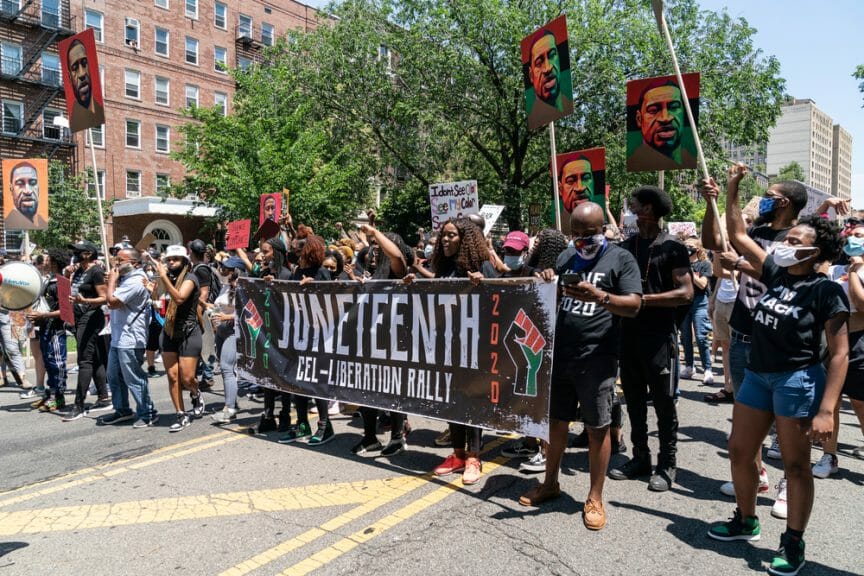As a recently established federal holiday, the history of Juneteenth isn’t widely known. Though, the day marks an important moment in American history and is considered the longest-running African American holiday.
What is Juneteenth?
Juneteenth, short for June Nineteenth, memorializes the effective end of slavery in the United States. It marks the day in 1865 (two and a half years after the Emancipation Proclamation) when the last slaves finally gained freedom.
Though Abraham Lincoln issued the Emancipation Proclamation on January 1, 1863, he couldn’t instantly free all enslaved people. In Texas, specifically, slavery continued as the state didn’t have a significant presence of Union troops. In fact, many enslavers moved to Texas precisely because it seemed to be a safe haven for slavery.
Finally, on June 19, 1865, 2,000 Union troops arrived in Galveston Bay, Texas to declare that the more than 250,000 enslaved people were free by executive decree. For this reason, it is sometimes alternately referred to as America’s Second Independence Day, Freedom Day, or Emancipation Day.
“The people of Texas are informed that, in accordance with a proclamation from the Executive of the United States, all slaves are free.”
General Gordon Granger, General Orders No. 3
Finally, in December of 1865, the 13th Amendment officially ended slavery nationwide with its ratification.
Recent History of Juneteenth
In 1979, Texas became the first state to make Juneteenth an official holiday, with other states following suit. Though, it wasn’t until June 17, 2021, that Congress passed a resolution establishing Juneteenth as a federal holiday. It is now the 12th federal holiday to be recognized and the first national holiday to be established since 1983—when Martin Luther King, Jr.’s birthday began being honored.
Even so, some Americans refuse to acknowledge Juneteenth as a credible holiday.
And others believe the holiday is simply a way to lessen the importance of the Fourth of July.
However, African American communities have celebrated Juneteenth for over 150 years. In 1866, free men in Texas organized the first annual celebration of the holiday. The commemorations usually included music, barbecues, prayer services, and more. And, as Black people migrated from Texas, the celebrations of Juneteenth spread.
“Juneteenth was not embraced as a national Black holiday for a long, long time. But it was kept alive by Black people in Texas. And that’s what’s so sweet about it. Our people have been hungry for holidays. Hungry for traditions. Hungry for stories about Black history.”
Henry Louis Gates, Jr., Harvard professor
How is Juneteenth Celebrated?
Now that Juneteenth is a federal holiday, many get the day off from work and/or school. So, the question has arisen of how it should be celebrated.
Juneteenth festivities started with large outdoor celebrations among formerly enslaved families. These gatherings were especially revolutionary since they were free from restrictive “Black codes” that had been enforced in Confederate states. And still today there are outdoor festivals and barbecues to commemorate the holiday.
“It felt good to see all kinds of Black people in one place. Juneteenth became a time when I wasn’t made to feel like we were a minority.”
Koritha Mitchell, English professor
One staple of these parties is the color red, which symbolizes the bloodshed of enslaved ancestors. In this way, popular Juneteenth menu items include red meat, watermelon, and/or red velvet cake.
Though, some prefer to use Juneteenth as a day of rest and remembrance, instead. Some ideas for a more calm day include doing community service, attending an educational panel, or reading a related book.
Specifically if you’re worried about celebrating the holiday as a non-Black person, finding ways to engage with the history of the day and learn about its significance are good options. Beyond recognition and celebration, taking the time to educate yourself is a great way to honor the day.
“That goes longer than a celebration. I think Black people need to do it too because it’s new for us as well, in America. But for non-Black people, if they could read on this topic and read on Black history beyond Martin Luther King and Rosa Parks, that would show me that you’re really serious about growing in this area.”
Dr. Karida Brown, Sociology professor
Though, no matter how you choose to celebrate, the important thing is offering respect for the holiday and all it represents.














